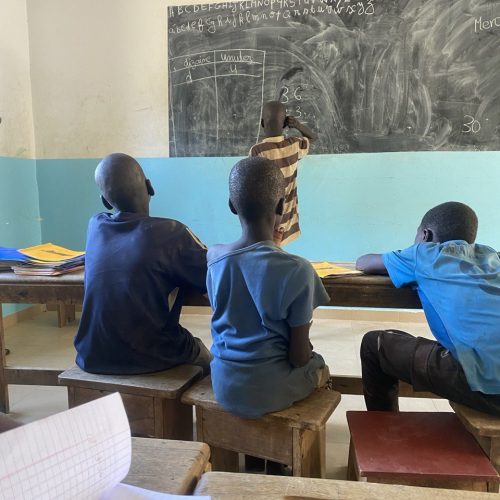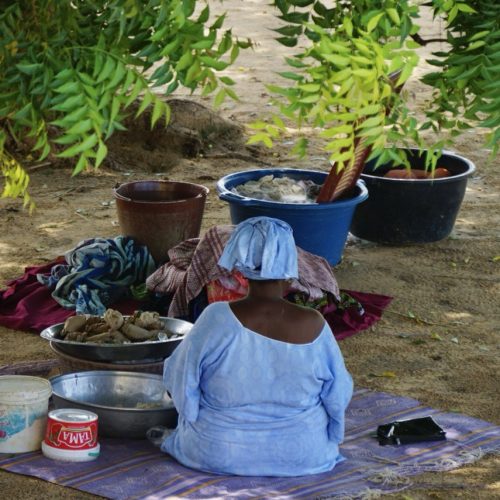Senegal: The Story of the Talibe and Marabou Children
When I left for Senegal, I had a'vague idea of what I would find. I had signed up for a volunteer program with the M. association, a center that deals with'assistance to Talibe children who gravitate around the system of Daara: transformed structures that, exploiting poverty and religion, have perpetuated a system of abuse against children.
The reception center is located in Malicounda, a small rural village about an hour from Dakar in southern Senegal. L'The building was simple, with a characteristic tin roof and basic facilities: classrooms, a kitchen, a small infirmary, and dormitories for volunteers.'When I arrived, I was welcomed by two Italian volunteers, V. and M., who had already been there for a few weeks and were organizing recreational activities for the children. Fatu, the cook, prepared the meals: sandwiches spread with mayonnaise and vegetable stock, a simple dish but one that had to feed hundreds of children every day. They divided 60/70 baguettes among about 300 children, while on Mondays, when there were fewer children, they only had rice and milk. We volunteers ate pasta, some vegetables and rice when the children were not there.'they were, but the heat also took away the hunger. C'It was also Ibu, the local nurse who tried to take care of the children every morning, but with very few means. The wounds on their feet, the infections, the abrasions were daily bread. Ibu tried to treat them with what he had: plasters, disinfectants, ointments. But when the children played, everything disappeared: the medical material was stolen, the wounds reopened.
The children arrived at the center every morning, always crumpled and full of fear. Despite the unbearable heat, they never took off their jackets and sweatshirts, for fear that others would steal them. There were always more than we could handle and with difficulty we managed to guarantee them a meal, a weekly bath, a change of clothes, a space to play and basic lessons in French and mathematics.
In the first few days, the feeling of emptiness was almost palpable. The hours never passed. In my heart, different emotions were mixed: anger, sadness, but also a certain understanding. I asked myself: what could I do in a place where the suffering was as evident as the'impossibility of solving injustices in a concrete way? I started asking questions, talking to local colleagues, trying to better understand the dynamics that supported that system of Daara and the Talibe children, wondering how I could, in my small way, do something that really made sense.

The Tale of the Talibe Children: A System That Exploits Poverty and Religion
The history of the Talibe children is closely linked to that of the Marabou and Daara. These Koranic schools, created centuries ago to teach children Islamic precepts, have transformed over time into real social traps. The Marabou should educate children, teaching them to read and write the Koran, but in reality many Daara have become places of exploitation. Children between 4 and 18 years old, often from poor families, are taken and forced to beg on the streets for the Marabou, receiving little food and an uncertain survival in exchange.
Life in the Daara was marked by the deprivation of everything: from'formal education on access to basic rights such as'drinking water, a place to sleep, decent clothes. Most of the children lived in miserable conditions, forced to sleep on dirt floors, without beds, without a corner where they could feel safe. The heat of the day turned into unbearable humidity at night and the children slept all huddled together, pressed against each other, in a forced embrace.
The reality is that the Talibè lived on the margins of society, without rights, with a life marked by daily survival. My hope was that, through our small center, they would at least have a place where they could feel safe for a while, away from the harshness of the street and the brutality of the Marabou. But I knew that even this was just a drop in the ocean.
A Saturday in the Heart of the Daara: A Firsthand Experience
One Saturday morning, together with the other volunteers, we went to clean one of the largest Daaras in the area, which housed about 100 children and was managed by two Marabù. It was a two-story structure, very dilapidated and “decorated” with rags hung to cover holes in the walls and ceiling. The children were all crowded into a very small room, where they were praying, reciting songs in Arabic that, in all likelihood, they did not really understand. The floor, composed entirely of stones and beaten sand, made any type of cleaning difficult. Despite this, we adapted, trying to do the best we could with a few brooms to bring at least a minimum of order. During that'experience, I contracted one of the most common infections in those conditions: a subcutaneous worm, found in animal feces. It manifests itself with red threads and fever, and left me with visible scars, which I still bear today. For the children living in the Daara, this type of disease is just a part of their daily life, something to live with, with no hope of change. My reaction left a painful awareness: their daily survival, unlike mine, is made of small lost wars, of physical and psychological scars that no one seems to notice.

The Difficulty of Being a Woman: The Violence of the System and the Culture Without Filter
Another aspect that deeply affected me was the role of women. As a woman, I have never felt completely at ease in a context like that. Senegalese culture, unfortunately, has a profound impact on power dynamics, el'authorities in structures such as those of the Daara is almost exclusively male. Not only are women often victims of discrimination, but their ability to influence children and their education is minimized.
I heard many times from my colleagues, V. and M., the frustration of not being able to have the same impact that a man could have. The children were often more aggressive and distant with us women, perhaps because they were raised in a Patriarchal system. The presence of local men, especially A. and M. (two former Talibes who now helped in the center), was crucial to mediate the most difficult situations, to manage the children and to maintain order.

My Reflectivity: The Journey That Changes Your Worldview
At the beginning of my journey, I thought I had a clear mission: to tell the story of the Talibe children and, with the few means I had, bring about change. I believed I could make a difference by offering children small solutions: teaching them an extra word, giving them a smile, giving them the feeling of not being invisible. It seemed like a simple but fundamental goal.
But by the end of the month, my mission had changed. I had no solutions, no certainty that my presence had had a tangible impact. Yet I had gained something much deeper: the awareness that change is not always immediate. I had learned to respect that culture, with all its contradictions and injustices, and to understand that sometimes what we can do is simply observe, witness, without pretending to solve everything. The real lesson was in seeing things from a new perspective, recognizing how great the suffering is, but also how important it is, within the limits of what we can do, to try to alleviate it.
Article and photos by Nicoleta Anca Milos